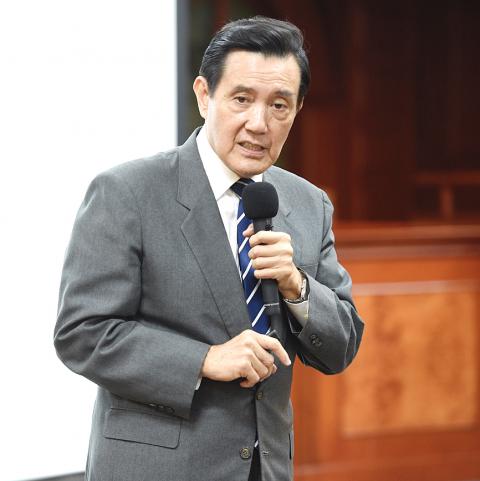Former president Ma Ying-jeou (馬英九) yesterday defended his statement that Taiwanese should not oppose unification, which he said is established by the Constitution.
Ma made the remark during a speech on cross-strait relations at Soochow University’s Chengzhong Campus in Taipei after a participant asked why Ma changed his “three noes” policy that underpinned cross-strait interactions during his eight-year presidency.
The “three noes” refers to Ma’s slogan of “no unification, no independence and no use of force.”

Photo: George Tsorng, Taipei Times
He on Nov. 7 revised his stance to “no opposition to unification” in a speech marking the third anniversary of his meeting with Chinese President Xi Jinping (習近平).
“Unification is a goal stipulated in our Constitution, but there is no timetable,” Ma said, adding that the process must be democratic and peaceful.
Ma said that he proposed the idea of “no opposition to unification,” because this was something that might happen, depending on the conditions and timing, and that he wanted to bring the issue to the attention of Taiwanese so that they could decide their own fate amid fluctuating cross-strait ties.
Regarding the so-called “1992 consensus,” Ma said that it is akin to a contract that has served as a political foundation for cross-strait ties.
“If you want to change it, it will need the consent of the other party. Otherwise it could jeopardize mutual trust across the Taiwan Strait,” he said.
Ma said the “consensus” was not fabricated by former Mainland Affairs Council chairman Su Chi (蘇起), but rather proposed by the Straits Exchange Foundation under the guidance of then-president Lee Teng-hui (李登輝) in November 1992 and accepted by the Chinese Association for Relations Across the Taiwan Straits.
The “1992 consensus” — a term Su in 2006 admitted making up in 2000 — refers to a tacit understanding between the Chinese Nationalist Party (KMT) and Beijing that both sides acknowledge there is “one China,” with each side having its own interpretation of what “China” means.
Beijing has never publicly endorsed the existence of the “different interpretations” element.
Ma also questioned President Tsai Ing-wen’s (蔡英文) policy of maintaining the cross-strait “status quo,” which Tsai said would remain unchanged, despite the Democratic Progressive Party’s losses in the Nov. 24 elections.
“Which ‘status quo’ is she referring to? The one under my administration or that under the administration of former president Chen Shui-bian (陳水扁)?” Ma asked, adding that Chen’s lacked the “1992 consensus.”

Taiwanese can file complaints with the Tourism Administration to report travel agencies if their activities caused termination of a person’s citizenship, Mainland Affairs Council Minister Chiu Chui-cheng (邱垂正) said yesterday, after a podcaster highlighted a case in which a person’s citizenship was canceled for receiving a single-use Chinese passport to enter Russia. The council is aware of incidents in which people who signed up through Chinese travel agencies for tours of Russia were told they could obtain Russian visas and fast-track border clearance, Chiu told reporters on the sidelines of an event in Taipei. However, the travel agencies actually applied

Japanese footwear brand Onitsuka Tiger today issued a public apology and said it has suspended an employee amid allegations that the staff member discriminated against a Vietnamese customer at its Taipei 101 store. Posting on the social media platform Threads yesterday, a user said that an employee at the store said that “those shoes are very expensive” when her friend, who is a migrant worker from Vietnam, asked for assistance. The employee then ignored her until she asked again, to which she replied: "We don't have a size 37." The post had amassed nearly 26,000 likes and 916 comments as of this

New measures aimed at making Taiwan more attractive to foreign professionals came into effect this month, the National Development Council said yesterday. Among the changes, international students at Taiwanese universities would be able to work in Taiwan without a work permit in the two years after they graduate, explainer materials provided by the council said. In addition, foreign nationals who graduated from one of the world’s top 200 universities within the past five years can also apply for a two-year open work permit. Previously, those graduates would have needed to apply for a work permit using point-based criteria or have a Taiwanese company

The Shilin District Prosecutors’ Office yesterday indicted two Taiwanese and issued a wanted notice for Pete Liu (劉作虎), founder of Shenzhen-based smartphone manufacturer OnePlus Technology Co (萬普拉斯科技), for allegedly contravening the Act Governing Relations Between the People of the Taiwan Area and the Mainland Area (臺灣地區與大陸地區人民關係條例) by poaching 70 engineers in Taiwan. Liu allegedly traveled to Taiwan at the end of 2014 and met with a Taiwanese man surnamed Lin (林) to discuss establishing a mobile software research and development (R&D) team in Taiwan, prosecutors said. Without approval from the government, Lin, following Liu’s instructions, recruited more than 70 software